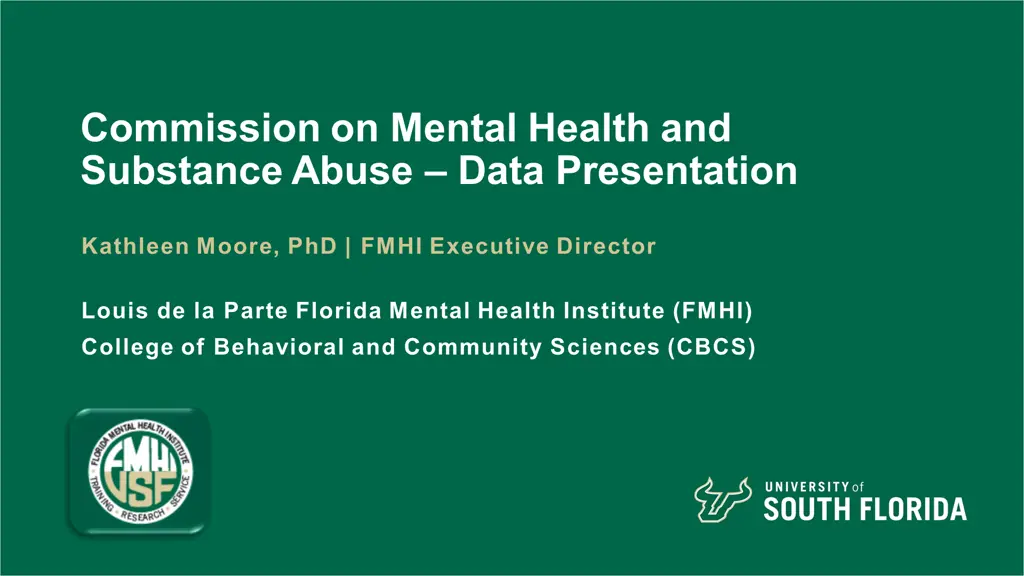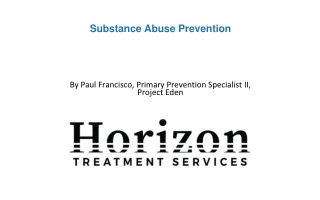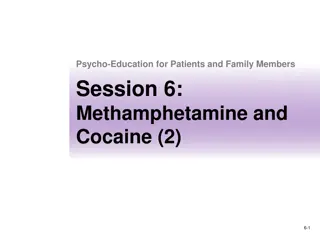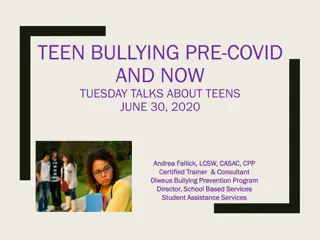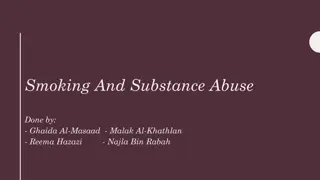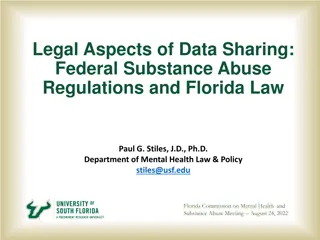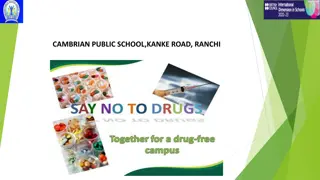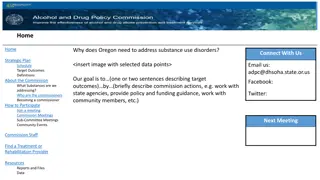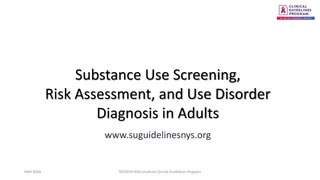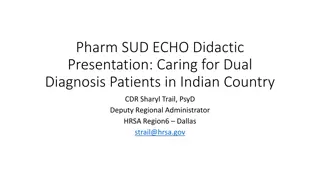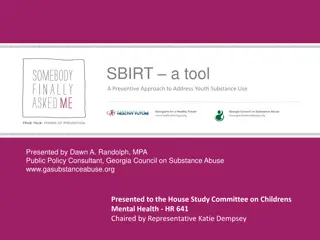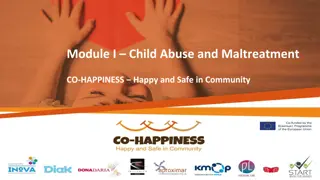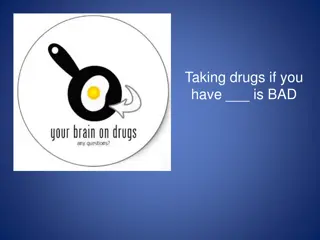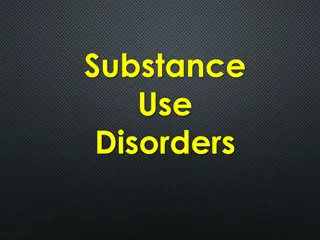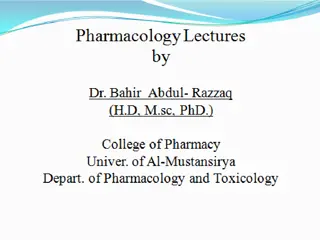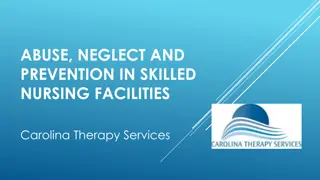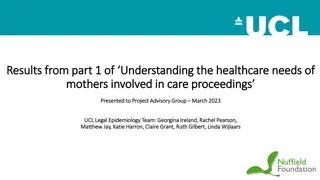Commission on Mental Health and Substance Abuse
The work of the Commission on Mental Health and Substance Abuse and their efforts to improve lives through research, training, and education. Presented by Kathleen Moore, PhD, Executive Director of the Louis de la Parte Florida Mental Health Institute.
Download Presentation

Please find below an Image/Link to download the presentation.
The content on the website is provided AS IS for your information and personal use only. It may not be sold, licensed, or shared on other websites without obtaining consent from the author. Download presentation by click this link. If you encounter any issues during the download, it is possible that the publisher has removed the file from their server.
E N D
Presentation Transcript
Commission on Mental Health and Substance Abuse Data Presentation Kathleen Moore, PhD | FMHI Executive Director Louis de la Parte Florida Mental Health Institute (FMHI) College of Behavioral and Community Sciences (CBCS)
Statutory Mission of Louis de la Parte Florida Mental Health Institute Improve lives of people with mental, addictive, and developmental disorders through research, training, and education (enacted in 1974) Currently, FMHI serves as a national leader in behavioral health services research, policy, training and education, technical assistance, and dissemination
HISTORY OF FMHI 1967 2008 1980 s 1990 s Florida Legislature provided $16 million to construct a mental health facility at the University of South Florida. Several research centers were developed related to Children's Mental Health, the Autism and Related Disabilities, Juvenile Justice, Aging, and HIV Education. FMHI focused more of its research and training on community-based project. The Institute was asked by the Legislature to help revise the state's civil commitment law, known as the Baker Act. FMHI became a part of the newly formed College of Behavioral and Community Sciences (CBCS). FMHI was transferred to USF as an independent budget entity reporting to the University President on a level equivalent to that of a college. FMHI became enacted into law with Florida statute (540.214). 1983 The Florida Legislature honored former state Senator Louis de la Parte for his lifelong commitment to advocacy for improved social and mental health services by naming the Florida Mental Health Institute after him. 1996 Florida Mental Health Institute (FMHI) officially opens. 1974
College of Behavioral and Community Sciences (CBCS) Mental Health Law & Policy School of Aging Studies Criminology Communication Sciences & Disorders School of Social Work Louis de La Parte FMHI continues to focus on some of society's most challenging problems through its research, consultation, and training carried out by FMHI Affiliates College of Behavioral and Community Sciences Child & Family Studies Florida Mental Health Institute (FMHI)
Centers within College of Behavioral and Community Sciences (CBCS) Criminal Justice Mental Health & Substance Abuse Technical Assistance Center (CJMHSA TAC) Center for Child Welfare Policy and Services Research Data Center (PSRDC) Baker Act Reporting Center
Center for Child Welfare Works in collaboration with the Department of Children and Families to ensure information on site is accurate and useful to child welfare professionals and others (funded by Florida's Department of Children and Families). Key areas include: Comprehensive Resource and Video Training Library by Subject Area. Frequently Asked Questions (FAQs) Processes and responds to requests on policy clarification. Web Events Sponsors and hosts live web events and other web conferencing services such as training, meetings, and workgroup events. Online Training Credentialed by Florida Certification Board to provide in-service training for re- certification of child welfare professionals and foster parents. Just in Time Training (Quality Parenting Initiative) - Responds to requests from foster parents for training topics and provides live and recorded training for foster parents, related caregivers, and child welfare professionals.
Criminal Justice, Mental Health, & Substance Abuse Technical Assistance Center (CJMHSA TAC) Funded by Florida Department of Children and Families, CJMHSA TAC provides training and technical assistance CJMHSA Reinvestment grantees. Training and technical assistance occur on- and off-site based on need of grantees and type of assistance. Conducts Sequential Intercept Mapping sessions throughout state. Model identifies six key points for intercepting or interacting with individuals who have behavioral health issues, and links them to services and supports that prevent further penetration into the criminal or juvenile justice system. Quarterly conference calls (telephonically or via webinar) are conducted with grantees to share evidence-based practices and processes delivered by USF, state, and national subject matter experts. They review grantee quarterly reports and prepare an annual report summarizing technical assistance activities as well as the progress of grantees.
Baker Act Reporting Center (BARC) Receives, processes, and analyzes statewide involuntary (Baker Act) examination data (since 2002). Disseminates fiscal year annual report for both children and adults. There were 210,992 involuntary (Baker Act) examinations in Fiscal Year 2018/2019. Receives involuntary examination forms from 125+ receiving facilities. Baker Act specifies that the following must be mailed to DCF within one working day: Report of Law Enforcement Officers Initiating Involuntary Examination Certificate of Professional Initiating Involuntary Examination Ex-parte Order for Involuntary Examination Receives petitions and orders for involuntary inpatient placement and involuntary outpatient services from Clerks of Court statewide.
Policy and Services Research Data Center (PSRDC) Agency for Healthcare Administration (AHCA) Florida Department of Corrections (DOC) Florida Department of Juvenile Justice (DJJ) Founded in 1996, PSRDC is a recognized leader in management and dissemination of mental health data generated throughout Florida and beyond. Examples of state datasets accessed by PSRDC Informs public policy and program development through the timely collection, integration, and analysis of data. Florida Department of Health (DOH) Florida Department of Law Enforcement (FDLE) Located within Department of Mental Health and Policy, PSRDC serves academic departments across University of South Florida, along with a variety of local, state, and federal organizations. Florida Substance Abuse Mental Health (FSAMS) Florida Department of Children and Families
Examples of Studies Utilizing Statewide Datasets Carrfour Supportive Housing s Coalition Lift Program Evaluation (Data included DCF, AHCA, and local agencies). Recipient of a special appropriation of funding through the Florida Housing Finance Corporation to fund one of three pilot sites demonstrating effectiveness of providing permanent supportive housing to high utilizers of crisis services who are experiencing housing instability. Evaluation of Substance Abuse Treatment Service Access and Utilization in Florida s Managed Medical Assistance Program (Data included SAMHIS and AHCA) Evaluated structure of and differences in access to substance abuse treatment services and utilization of services across Florida Medicaid Managed Medical Assistance (MMA) plans. Firearm Laws, Mental Disorder, and Violence (Data included DCF, DOC and local data sources. Was denied use of FDLE data) Examined the impact of firearm laws and mental disorders on gun violence. We ended up focusing on just Pinellas and Miami Dade due to our inability to get statewide arrest data.
Example of County Data Collaborative Pinellas County Data Collaborative was established in the fall of 1999 as a result of Chapter 163.62 Florida Statute, which allowed governmental and certain private agencies to share information. It was created to enhance the delivery of mental health programs to Pinellas County residents by encouraging communication and collaboration among community providers, organizations, interested government agencies, and educational institutions: USF Policy and Services Research Data Center Pinellas County Board of County Commissioners Pinellas Clerk of Circuit Court Pinellas County Sheriff Office Pinellas County Department of Health and Human Services Sixth Judicial Circuit Court of Florida Emergency Medical Services Juvenile Welfare Board of Pinellas County Florida Department of Children and Families SunCoast Region Florida Department of Juvenile Justice
Data Challenges and Future Directions Challenges: Data access Data use agreement approval Funding for data use and analysis by subject matter experts Data sharing and confidentiality Data Access & Approval Funding Subject Matter Experts Future Directions: FMHI and our college has a long history of collaboration with state agencies on data analysis Opportunities to expand data collaboratives Better informed decision-making abilities at the state and county level
Thank you very much for the opportunity to present this morning Kathleen Moore: kamoore@usf.edu
